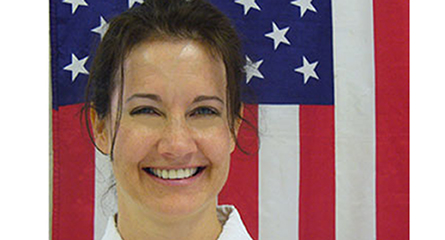Dr. Holly L. Damico, an assistant professor of communicative disorders at UL Lafayette, has brawn and brainpower to match.
The third-degree black belt in karate recently qualified for a spot on the five-member U.S. women’s sparring team that will compete in the Funakoshi Gichin Cup World Karate-Do Championship 2014. The international tournament, also known as the Shoto Cup, will be held Oct. 17-19 in Tokyo. Competitors from around the world will vie for individual and team recognition.
“Sparring is full contact, but it’s supposed to be controlled contact. You will get warnings and even disqualifications for excessive contact. But, you have to make contact if you’re going to score,” Damico said of tournament judging. As with boxing or figure skating, points are awarded on performance and skill.
Competitors usually square off in rounds that last two or three minutes. To catch the eyes of judges, they must demonstrate a certain amount of artistry in executing moves and connecting with blows. “You have to have appropriate distance, timing, technique, posture, spirit. All of that is taken into account,” she explained.
Damico qualified for the Shoto Cup earlier this year in New Orleans, at an invitation-only team trials event that featured competitors who, like Damico, consistently compete and place at regional and national tournaments.
Based on her showing at the tournament, she earned a spot on the U.S. team alongside two members in their 20s, and another two in their 30s. “And then there’s me, representing the 40-something aspect of that,” quipped Damico.
Her karate skills, on the other hand, are no laughing matter.
Damico was a collegiate champion at the All-South Tournament in New Orleans in 2012, the year she earned her doctoral degree in speech-language pathology from the University of Louisiana at Lafayette. She has also placed in the top three in national championship events sponsored by the Japan Karate Association, which has branches worldwide.
Damico was introduced to karate in 2001, when, bored with aerobics and running, a colleague suggested she try the sport.
“When I first started, it was about the exercise and the recreation. Someplace to go and work up a sweat. But I pretty quickly realized, to learn everything that needs to be learned, you need to train consistently,” she said.
Damico typically trains two or three times a week at the Lafayette Karate Club, which she co-founded, or with the UL Lafayette Karate Club at Bourgeois Hall, where she also helps train student members.
She will amp up her workout schedule as the world championships draw closer, all the while juggling summer school teaching duties and clinical work she does four days each week.
“I have to be as prepared as anyone,” she said. “Most of the other alternates that I know who have gone to these tournaments have had to step in.”
Learn more about the Japan Karate Association.
